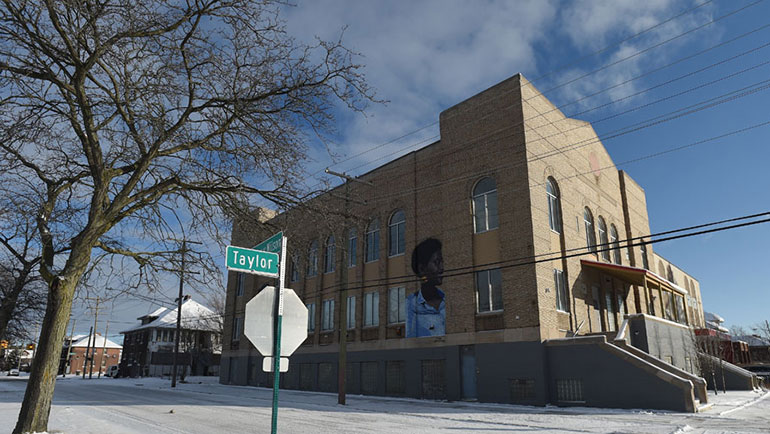WSU College of Nursing receives $1.5M grant to expand mental health care access and interprofessional workforce training in Detroit
The Wayne State University College of Nursing was recently awarded nearly $1.5 million from the Nursing Education, Practice, Quality and Retention (NEPQR) program of the Health Resources and Services Administration (HRSA). The grant will expand mental health care access and transform the current and future Behavioral Health Intervention (BHI) workforce by creating fully integrated collaborative systems in two medically underserved communities in Detroit Michigan.
“Wayne State’s College of Nursing is committed to community care—on campus and in surrounding areas,” said Dean Laurie Lauzon Clabo. “The evidence shows that those from disadvantaged communities often struggle with access to mental health services. Gaining these services is critical to improving health care outcomes for these most vulnerable communities.” According to a 2019 Altarum Research Brief, millions of Michiganders experience mental illness, but less than two thirds receive treatment.
With the NEPQR funding, project director Dr. Cynthera McNeill and team members Dr. Umeika Stephens and Dr. Jeffrey Kuentzel aim to expand mental health care access and to transform the BHI workforce through their “Strategic Integration to Grow Mental Health Access (Addressing St.I.G.M.A.)” program.

The team will use an evidence-based approach and work collaboratively with two nurse-managed primary care centers that provide care in two medically underserved communities to enhance the access, quality and cost of care to its patient populations. The two sites are the WSU Campus Health Center and the Taylor Street Primary Care Clinic in Detroit.
“The need for a workforce who practice as part of a primary care behavioral health integrated team is immense in Detroit and other medically underserved communities,” said Dr. Ramona Benkert, WSU College of Nursing associate dean. “Working with these two local clinics is critical because primary care clinics are the entry point for care for most patients with mental illness; primary care providers deliver half of the mental health care accessed.”
Over time, state budget cuts have led to the closing of two large Detroit-based community mental health agencies that served residents of Wayne County: Detroit East Health Center and New Center Community Mental Health Center. The centers provided care for nearly 5,000 city and county residents combined, and their loss leaves many without access to adequate care.

“The gap left by these closures has led to a shortage of mental health providers and services, which in turn, impacts homeless, poverty, incarceration, and death numbers,” said Dr. McNeill. “Many who live in the city do not have reliable access to transportation and often have multiple health conditions.” She continued, “These health disparities further exacerbate common conditions such as anxiety, ADHD, depression, behavioral problems, and substance use.”
Funds for the Addressing St.I.G.M.A. program will be used to enhance existing and establish new Behavioral Health Integration teams during the 3-year project, provide interprofessional education to 36 Wayne State Advanced Practice Registered Nurse (APRN) students and 16 WSU social work students with preceptors at the two sites, and create replicable primary care advanced education nursing workforce interprofessional training program.
Dr. McNeill noted that, “Patient-care provider trust is key. If I can walk my patient down to meet the mental health provider, they are much more likely to follow up and receive that care. And research has found that people who receive mental health care are more likely to achieve increased overall health outcomes.”
A major goal of this program is to create a sustainable model, support for the behavioral health providers and ongoing quality monitoring to ensure continued patient access to mental health care beyond the grant period.
About the Campus Health Center (CHC), Nursing Practice Corporation, Inc.-Nurse Managed Health Centers (NMHC)
- CHC is a non-profit NMHC providing accessible and quality care to students, faculty and staff of Wayne State University.
- CHC’s year-round NMHC provides services to over 6400 patients with an average of 8800 visits per year.
- The CHC has served as a clinical placement site for the last 12 years for APRN students and undergraduate nursing students.
About Taylor Street Primary Care Center (TSPCC), Nursing Practice Corporation, Inc.-Nurse Managed Health Center (NMHC)
- TSPCC is a non-profit NMHC providing accessible and quality care to residents of the Virginia Park community in Detroit. Construction of the TSPCC was completed in late 2019.
- It will provide year-round, five days a week NMHC primary care services to the potentially 17,000 residents in this community.
- TSPCC will serve as a clinical placement site for APRN students and undergraduate nursing students and social work students. Within a year the clinic will incorporate the opportunity for interprofessional education with students from other WSU professional health programs such as public health, and pharmacy.